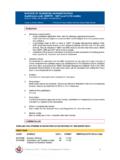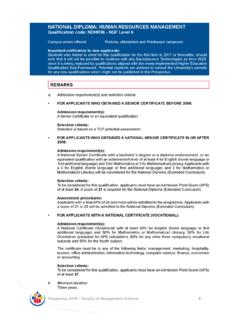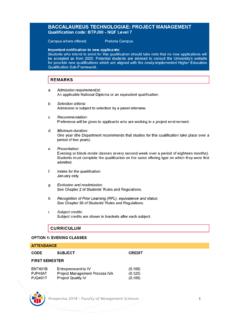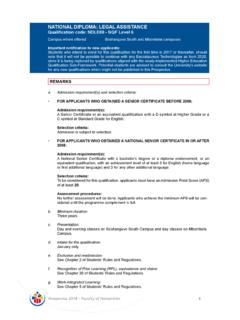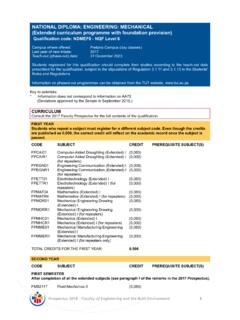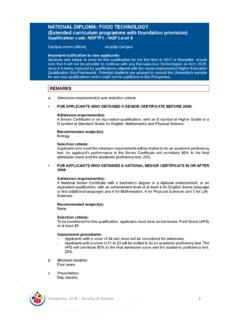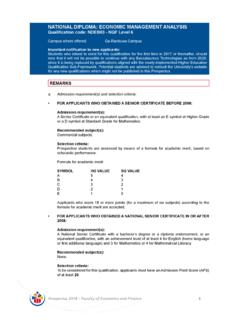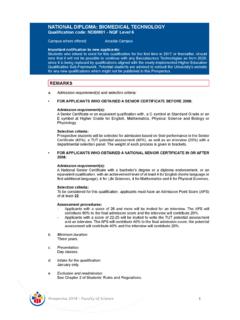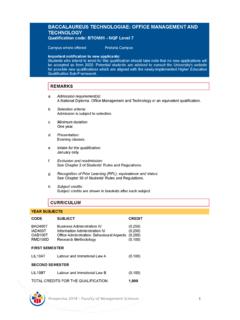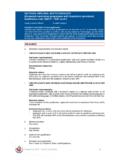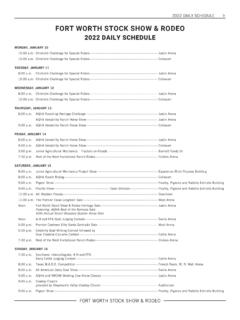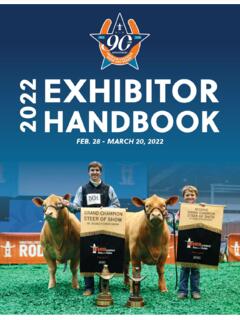Transcription of DIPLOMA IN ANIMAL SCIENCES Qualification code: DPAA19 …
1 1 Faculty of Science DIPLOMA IN ANIMAL SCIENCESQ ualification code: DPAA19 - NQF Level 6 (360 credits) SAQA ID: 100974, CHE NUMBER: H16/14304/HEQSF Campus where offered: Pretoria CampusREMARKSa. Admission requirement(s) and selection criteria: Acceptance is subject to available capacity according to the Student Enrolment Plan (SEP). Once a programme is full, a waiting list will be in place to provide an opportunity for applicants to fill places of those who did not register on time. Applicants will be informed of their status per official letter from the Office of the Registrar, alternatively, they can check their application status on the TUT website, APPLICANTS WITH A SENIOR CERTIFICATE OBTAINED BEFORE 2008: Admission requirement(s):A Senior Certificate or an equivalent Qualification , with at least an E symbol at Higher Grade or a D symbol at Standard Grade for English and subject(s):Preference will be given to applicants with Agricultural Science, Biology and/or Physical criteria: Applicants are selected by means of a formula for academic merit, based on scholastic performance.
2 The formula for determination of academic merit are as follows:SYMBOL HG VALUE SG VALUEA 8 7B 7 6C 6 5D 4 3E 2 1 Applicants are given two additional points for the following subjects (SG or HG):Agricultural Economics, Agricultural Science, Agriculture, Biology, Chemistry, Computer Principles, Computer Studies, Field Husbandry, Geography, Mathematics, Physical Science, Physics, Practical Agriculture and/or Statistics. - Applicants with a score of 23 and more according to the formula for academic merit determination will be considered for admission. - Applicants with a score of 20 to 22 according to the formula for academic merit deter-mination will be kept on a waiting list from which the applicants with the highest scores will be selected.
3 Waiting lists will be cleared at the end of September and November. APPLICANTS WITH A NATIONAL SENIOR CERTIFICATE OBTAINED IN OR AFTER 2008:Admission requirement(s):A National Senior Certificate with a bachelor s degree or a DIPLOMA endorsement, or an equivalent Qualification , with an achievement level of at least 4 for English (home language or first additionallanguage) and 3 for Mathematics or Technical Mathematics or 4 for Mathematical Literacy. Recommended subject(s):Preference will be given to applicants with Agricultural SCIENCES , Life SCIENCES , and/or Physical of ScienceSelection criteria:To be considered for this Qualification , applicants must have an Admission Point Score (APS) of at least 19 (with Mathematics or Technical Mathematics) or 20 (with Mathematical Literacy). Life Orientation is excluded from the APS calculation.
4 Assessment procedures: - Applicants with a score of 23 and more will be considered for admission. - Applicants with a score of 20 (19 with Mathematics or Technical Mathematics) to 23 will be kept on a waiting list from which the applicants with the highest APS will be selected. Waiting lists will be cleared at the end of September and November. APPLICANTS WITH A NATIONAL CERTIFICATE (VOCATIONAL):Admission requirement(s):A National Certificate (Vocational) with a bachelor s degree or a DIPLOMA endorsement, with at least 50% for English (home language or first additional language) and 40% for Mathematics or 50% for Mathematical Literacy, 40% for Life Orientation (excluded for APS calculation), and 50% for any other three compulsory vocational subjects. Selection criteria:To be considered for this Qualification , applicants must have an Admission Point Score (APS) of at least 19 (with Mathematics) or 20 (with Mathematical Literacy).
5 Life Orientation is exclu-ded from the APS Recognition of Prior Learning (RPL), equivalence and status:See Chapter 30 of Students' Rules and Intake for the Qualification :January Presentation:Day Minimum duration:Three Exclusion and readmission:See Chapter 2 of Students Rules and WIL in ANIMAL Production:See Chapter 5 of Students Rules and FIRST YEAR CODE MODULE NQF-L CREDIT AAA105D ANIMAL Anatomy and Physiology I (5) (24)CAP105X Communication for Academic (5) (10) PurposesCPL105X Computer Literacy (5) (10)INI125D Information Literacy I (5) (2) (block module)LFI125X Life Skills I (block module) (5) (2)MAS105X Mathematics and Statistics I (5) (12)SOR105D Science for Occupational (5) (12) Purpose IFIRST SEMESTERENT115D Entrepreneurship I (5) (12) 3 Faculty of SciencePAE115D Pasture Science I (5) (12)SECOND SEMESTERABG115D ANIMAL Breeding and Genetics I (5) (12) ANT115D ANIMAL Nutrition I (5) (12) TOTAL CREDITS FOR THE FIRST YEAR.
6 120 SECOND YEAR CODE MODULE NQF-L CREDIT BPA206D Beef Production II (6) (24) DPA206D dairy Production II (6) (24)PDN206D Poultry Production II (6) (24)SSA206D Small Stock Production II (6) (24)VPA206D Pig Production II (6) (24)TOTAL CREDITS FOR THE SECOND YEAR: 120 THIRD YEAROn completion of all the modules from the first- and second year. CODE MODULE NQF-L CREDIT WAP306D WIL in ANIMAL Production (6) (120)TOTAL CREDITS FOR THE THIRD YEAR: 120 TOTAL CREDITS FOR THE Qualification : 360 MODULE INFORMATION (OVERVIEW OF SYLLABUS)The syllabus content is subject to change to accommodate industry changes.
7 Please note that a more de-tailed syllabus is available at the Department or in the study guide that is applicable to a particular module. At time of publication, the syllabus content was defined as follows:AANIMAL ANATOMY AND PHYSIOLOGY I (AAA105D) 1 X 3-HOUR PAPER(Module custodian: Department of ANIMAL SCIENCES )An informed understanding of the principles of ANIMAL anatomy and physiology is important. Students will acquire knowledge, skills and applied competencies in areas such as: general anatomy and physiology of animals; ANIMAL cells, tissues and organs; musculoskeletal systems; ANIMAL body regulatory systems; haem-atology and body defense mechanisms; thoracic internal organs including cardiovascular and pulmonary systems; digestive system and accessory glands; male and female urogenital systems and mammary gland; applicable Acts and regulations; and how that knowledge relates to other fields, disciplines or practices.
8 (Total tuition time: 240 hours) ANIMAL BREEDING AND GENETICS I (ABG115D) 1 X 3-HOUR PAPER(Module custodian: Department of ANIMAL SCIENCES )An informed understanding of the principles of ANIMAL breeding and genetics is important for livestock im-provement. Students will acquire knowledge, skills and applied competencies in areas such as: basic con-cepts of ANIMAL breeding and genetics, qualitative and quantitative traits of inheritance, population genetics and evolution, selection methods, breeding programmes and mating systems, molecular genetics, ANIMAL Improvement Schemes; applicable Acts and regulations; and how that knowledge relates to other fields, disciplines or practices. (Total tuition time: 120 hours)4 Faculty of ScienceANIMAL NUTRITION I (ANT115D) 1 X 3-HOUR PAPER(Module custodian: Department of ANIMAL SCIENCES ) An informed understanding of nutrition and nutrients requirements of farm animals is important.
9 Students will acquire knowledge, skills and applied competencies in the following areas: the components of feed, function of the diges-tive system, ANIMAL nutritional requirements, raw materials as feedstuffs, use of nutrients by farm animals, use of feed additives in ANIMAL feeding, feedstuff analysis and ration formulation, and processing of ANIMAL feeds; applicable Acts and regulations; and how that knowledge relates to other fields, disciplines or practices. (Total tuition time: 120 hours)BBEEF PRODUCTION II (BPA206D) 1 X 3-HOUR PAPER(Module custodian: Department of ANIMAL SCIENCES ) Students will acquire detailed knowledge, skills and applied competencies in areas such as: Beef cattle In-dustry and Beef cattle Improvement Schemes; Evaluation of beef cattle breeds; Beef cattle breeding plans, genetic evaluation and visual appraisal; Reproductive system; Production management of beef cattle ; Nutri-tional practices in beef cattle ; cattle handling equipment; Beef cattle diseases and disease control; Red meat classification system and red meat market; applicable Acts and regulations; and how that knowledge relates to other fields, disciplines or practices.
10 (Total tuition time: 240 hours)CCOMMUNICATION FOR ACADEMIC PURPOSES (CAP105X) 1 X 3-HOUR PAPER(Module custodian: Department of Applied Languages) A workable knowledge of English is an essential skill for any graduate who is required to conduct themselves successfully in a professional working environment. This module will equip students with the competencies required to compose a selection of written texts related to communicating both internally and externally within a professional environment. In addition, the module includes strategies that are essential for the effective com-munication in various situations, including small groups to avoid unproductive conflict, a multicultural context, etc. (Total tuition time: not available) COMPUTER LITERACY (CPL105X) CONTINUOUS ASSESSMENT(Module custodian: End User Computing Unit) Introduction of information literacy.
